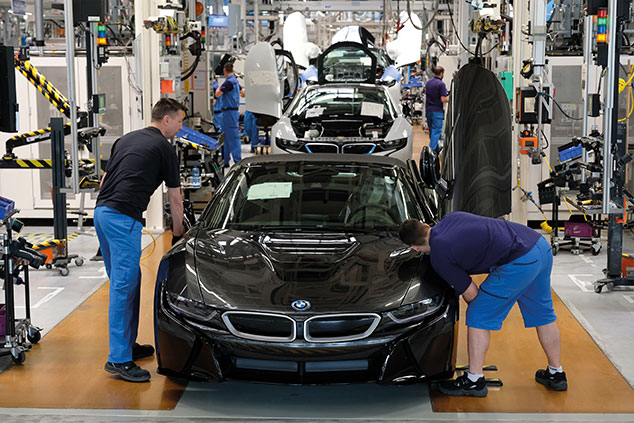
For a long time, Germany has been an exporting powerhouse. Its brilliantly efficient factories churn out well-engineered, fantastically designed products that sell for premium prices around the world. Europe’s largest economy is also the world’s third-largest exporter and, at more than $300bn annually, it also runs by far the world’s largest trade surplus. Dominated by pharmaceuticals, medical equipment, machine tools and cars, it has few equals.
Brexity headwinds
That may be about to change. In May, seasonally adjusted exports were down by 1.1%. The figures for June, published last Friday, were expected to show a rebound, but instead they fell again, with another 0.1% decline over the month. Over the year as a whole, exports are now down 8%. There are lots of reasons for that. China is slowing and is no longer so dependent on German imports. The US is not buying as much as it was and many eurozone countries have weak consumer demand.
But there is one other crucial factor: Brexit.
Germany’s exports to the UK are especially weak. Overall, German exports to Britain are down 4% year on year, on Commerzbank’s figures. A couple of years ago we were their third-biggest export market, but this year we have dropped to fifth, and we are still falling. “In April and May, German exporters sold almost as much to Austria as to the UK,” noted investment bank ING dryly in an analysis of the latest figures.
It hardly needed to add that Austria’s population is just eight million compared with our 65 million. In truth, the British market is in free fall. According to research from Deutsche Bank, pharmaceuticals has been the sector hardest hit, with exports from that industry down by 40%. Car exports are now down by more than 20%.
There are some short-term factors at work there. Sterling depreciated sharply after the referendum, and that made all exports from the eurozone less competitive. At the same time the British economy has been weakening and firms fearful of a no-deal exit have been postponing investment.
We’ve been Brexiting for years
But there is a bigger picture as well. Our trade flows with the eurozone have been declining rapidly for years now. From accounting for close on 60% of our trade, once imports and exports are combined, it is now down below 50%. It has been falling by a percentage point a year for more than a decade. Brexit has accelerated that.
Companies have understandably stepped up their efforts to find new markets and new sources of imports over the years we have been arguing about Brexit. And the areas where the UK has been strong in the last few years, such as technology, culture, business and legal services, and engineering, have all been a lot stronger outside Europe than within it. We sell less and less to countries such as Germany every year, and now we buy less and less from them as well. In many ways our vote to leave the EU was simply a matter of the politics catching up with the economics – measured by trade, we had been leaving for years.
That doesn’t matter hugely to the UK. We had a massive trade deficit with Europe, and with Germany in particular, so we have relatively little to lose if there is a further decline. By definition, it wasn’t working very well for us, otherwise we would not have had such a big deficit. But it will matter to the countries where exports fall sharply. They were running big surpluses, and so jobs and company profits were all boosted by easy access to the British market.
Once that is lost, it won’t easily be replaced. Germany will survive just fine, of course. It has plenty of great companies and lots of other major markets. The UK will still be one of them. But it is now clear that Germany will suffer significant damage. It is almost certainly too late now for Germany’s government to change tack and try to engineer a softer Brexit. But as its economy suffers long-term damage, there may well be a reckoning for the leaders who failed to broker a compromise that worked for both sides.